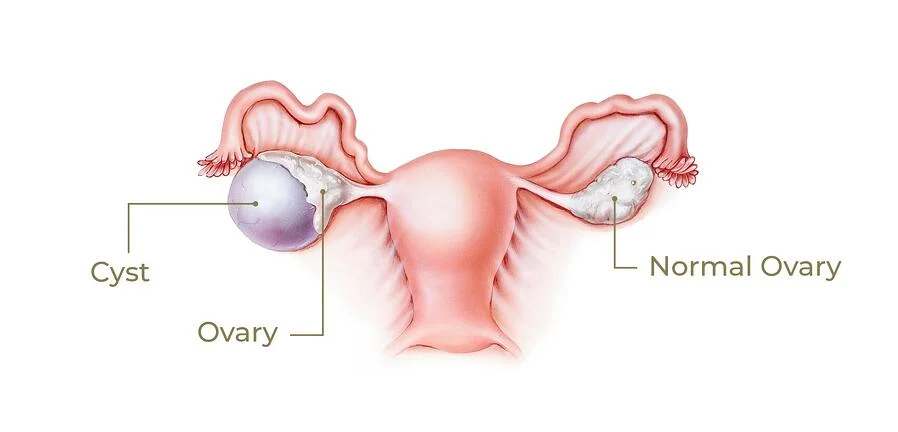
03 Jun Ovarian Cysts: Symptoms, Types, Prevention & Treatment
Ovarian Cysts: Symptoms, Types, Prevention & Treatment
By Island Hospital | June 3, 2024 12:00:00 PM
Medical Reviewer: Dr. Mahalakshmi Ratnavale, Obstetrics and Gynaecologist
Ovarian cysts are typically normal and nothing to worry about. Nonetheless, potential complications such as ruptured ovarian cysts may require immediate medical attention.
Moreover, certain conditions or medications may increase women’s risk for cysts, impacting their overall well-being. This underscores the importance of being well-informed of this condition.
This in-depth guide will explore everything you need to know about ovarian cysts. Learn to recognise potential signs of this cyst, increased risk factors, and when to seek medical attention.
The Ovaries
Women have two ovaries, each about the size and shape of an almond, on each side of the uterus.
Eggs (ova), which develop and mature in the ovaries, are released in monthly cycles during childbearing years.
What Are Ovarian Cysts?
Ovarian cysts are fluid-filled sacs or pockets in an ovary or on its surface. Many women have ovarian cysts at some time, where an estimated 10 out of 100 women have them.
Most ovarian cysts present little or no discomfort and are harmless. The majority disappears without treatment within a few months.
However, ovarian cysts, especially those that have ruptured, can cause serious symptoms.

Symptoms
Generally, women who have ovarian cysts are unaware of them. Symptoms usually only appear when complications happen. For example, cyst ruptures, ovarian torsion, and the presence of exceptionally large cysts can cause noticeable pain and changes in body functions.
Here are the symptoms you may experience:
- Dull pain in the lower abdomen (Pelvic pain)
- Heavy or irregular periods
- Spotting
- Swollen and bloated stomach
- Feeling of fullness
- Pain when peeing
- Constipation
- Sudden, sharp pain
- Sudden, severe cramping
- Nausea
- Vomiting
- Pain during sex
When to Seek Medical Care
Schedule a medical appointment immediately or call 999 if you experience the following symptoms:
- Sudden and severe pelvic pain.
- Pain in your stomach, with nausea and vomiting.
Types of Ovarian Cysts
Ovarian cysts are divided into two main types, functional ovarian cysts and pathological ovarian cysts.
Functional ovarian cysts
The most common type of ovarian cysts, which are related to the menstrual cycle. These cysts are usually harmless and not painful, resolving on their own within two or three menstrual cycles.
Here are a few types of functional ovarian cysts:
- Follicular cysts: A follicle is a sac which surrounds an egg. If the follicle does not open to release an egg, the follicle may fill with fluid and turn into a cyst.
- Corpus luteum cysts: Occurs when the follicle sac around the egg does not dissolve after the egg is released. This follicle may be filled with extra fluid and turn into a cyst.
Pathological ovarian cysts
A less common type of ovarian cysts. These cysts form due to abnormal cell growth, and typically need to be removed surgically.
Here are a few types of pathological ovarian cysts:
- Dermoid cysts*: Develop from cells which make eggs in the ovary. They contain tissue (e.g., hair, skin, teeth) and can grow fairly large. Most are not cancerous.
- Cystadenomas*: Develop from cells which cover the ovary. It is filled with watery liquid and mucous material, and can grow to very large sizes. Most are benign and not cancerous.
- Endometriomas (Chocolate cysts): Develop as a result of endometriosis. Cysts in the ovaries are caused by this condition, where uterine endometrial tissue grows outside the womb. It is filled with dark brown liquid. (The presence of this cyst shows that the endometriosis is at a more critical stage.)
*Note: Dermoid cysts and cystadenomas can grow large and cause the twisting of the ovary (ovarian torsion), which is very painful. This complication will be discussed further in this section.
Causes and Risk Factors
Here are a few causes and risk factors for developing ovarian cysts:
- Ovulation: The main cause of ovarian cysts, where functional ovarian cysts may develop during ovulation.
- Abnormal cell growth: Cell growth that is unusual may cause pathological ovarian cysts to form.
- Endometriosis: A medical disease where endometrial tissue is growing outside the uterine cavity (womb). Endometriomas (cysts filled with blood) can form in this tissue.
- Polycystic ovarian syndrome (PCOS): This condition causes the development of many small, harmless cysts on your ovaries. These cysts are egg follicles which fail to mature for ovulation, and are triggered by changes in hormone levels.
- Pelvic inflammatory disease (PID): Pelvic infections which are at a critical stage can spread to your ovaries and cause cysts.
- Infertility treatment: May lead to the development of cysts as part of ovarian hyperstimulation syndrome.
- Pregnancy: Ovarian cysts may develop during the second trimester of pregnancy.
- Cigarette Smoking: Increases the risk of functional ovarian cysts.
- Tubal ligation: Has been associated with the formation of functional cysts.
Do note that although this list provides insight into the possible causes and risk factors, it is not extensive. Should you have any concerns, consult your healthcare provider on your health and medical history.
Diagnosis
To diagnose ovarian cysts, your healthcare provider may conduct the following tests:
- Pelvic Exam: This exam is used to check for the health of female reproductive organs, namely the vulva, vagina, cervix, uterus, fallopian tubes, ovaries, and rectum. As the results are not definitive, another exam (e.g., vaginal sonogram) may then be carried out.
- Vaginal Sonogram: This imaging test is used to obtain an accurate picture of the ovary and cyst. It can help the doctor detect the size of the cyst, and check if it’s solid or fluid-filled. If found, this cyst will then be surgically removed.
- Ultrasound: This imaging test is used to create a precise picture of your reproductive organs. It can help the doctor detect the presence and location of the cyst, and check if it’s solid or fluid-filled. If found, this cyst will then be surgically removed.
- Blood Test: These tests are carried out if there’s a possibility the cyst is cancerous. Blood tests will measure high levels of certain chemicals, which could be an indication of ovarian cancer. However, these high levels could also be attributed to other conditions (e.g., endometriosis, pelvic infection, period).
Health screening tests are crucial for early detection and prevention of prevalent women’s health issues. Discover the essential screenings you need in this article.
Complications
Complications that may happen with cysts are:
- Ruptures (Bursts): Ovarian cysts, especially larger ones, can rupture. It may cause no symptoms or a sudden, sharp pain in the lower abdomen. It can lead to significant blood and fluid loss, leading to low blood pressure.
- Torsion (Twisting): A large cyst may cause the twisting of the ovary. It can block blood supply to the ovary, leading to sudden pain, nausea, and vomiting.
These complications require immediate medical attention. Schedule a medical appointment or call 911 as soon as you notice any of these symptoms.
Treatment
Treatment is usually not necessary if the ovarian cysts show little to no symptoms. Your healthcare provider will determine whether or not treatment is needed by evaluating factors such as:
- Size and appearance of the cyst
- Symptoms
- Menopause (Women who are postmenopausal have a higher risk of ovarian cancer.)
- Underlying causes of your cyst
Surgery may be needed if you experience the following:
- Complex ovarian cysts that are persistent.
- Cysts that are persistent and cause symptoms.
- Cyst that seems to be growing.
- Simple cysts that are large (more than 10 centimetres)
- You are near menopause or postmenopausal.
With that said, here are a few treatments your healthcare provider may recommend:
- Wait and See: Usually, the doctor will recommend ‘watchful waiting’ where you will not receive treatment immediately. Instead, a follow-up checkup is scheduled several weeks to months later to check if the cyst has disappeared on its own. If the cyst persists, surgery may be recommended.
- Medications: Some doctors may prescribe medications containing hormones, which reduces the hormone production level and stops ovulation – preventing the development of cysts. However, research has shown that medications such as birth control pills are ineffective in treating cysts.
- Laparoscopy: This surgical procedure is minimally invasive. The doctor will make a small incision in your abdomen, and insert the laparoscope (fibre-optic instrument) to see the ovarian cyst. Small instruments are then used to remove the cyst.
- Laparotomy: This surgical procedure may be recommended in cases where the cyst is large or if cancer is suspected. The doctor makes a larger cut into the abdomen and removes the cyst. If they suspect cancer, the ovary or other tissue may be removed as well. This surgery requires a longer recovery time compared to laparoscopy.
Prevention
As we mentioned earlier, some healthcare providers may recommend medications such as birth control pills to prevent the formation of ovarian cysts.
However, as ovarian cysts are generally harmless, prevention is usually not necessary. We recommend scheduling an appointment with your healthcare provider, and undergoing regular health screenings (pelvic exam) if you notice any symptoms.
Moreover, these symptoms could be the sign of other conditions, such as ovarian cancer. This highlights the importance of getting a proper diagnosis from your doctor.
Schedule an Appointment with Island Hospital
We hope this article equipped you to understand the signs, symptoms, and treatments of ovarian cysts. If you suspect the presence of a cyst, schedule a consultation with Island Hospital’s team of skilled gynaecologists.
Rest assured, we are ready to guide you through the entire process, and ensure you receive the best treatment. Take one step further by exploring our range of health screening tests, capable of detecting possible health issues early on.
If you’re searching for an all-inclusive experience for you and your loved ones, consider our Complete Screening Package for Women. It contains all the essentials: cancer marker tests, radiological screening, cardiovascular tests, and more.
FAQ
What are the early warning signs of an ovarian cyst?
Early warning signs of an ovarian cyst include pelvic pain, bloating, pressure, abdominal discomfort, irregular menstrual cycles, and changes in bowel movement.
However, symptoms will vary according to the type of ovarian cyst.
Learn more in this section.
What does ovarian cyst pain feel like?
Ovarian cyst pain can vary from dull aches to sharp pain in the lower abdomen. It may also cause pain during intercourse and pain when peeing.
Learn more in this section.
Can ovarian cysts be misdiagnosed?
Yes, ovarian cysts may be misdiagnosed due to symptoms overlapping with other conditions. Moreover, the testing must be conducted with high levels of accuracy to avoid misdiagnosis.
For instance, a 2021 study found that the combination of two diagnosis methods (computed tomography (CT) and type-B ultrasonography) for ovarian cysts were able to produce more accurate results.
Therefore, it’s important to undergo a thorough diagnosis process with your healthcare provider.
What should I do if I have an ovarian cyst?
If you suspect you have an ovarian cyst, schedule a consultation with a healthcare provider. They may recommend imaging tests like ultrasound, and prescribe treatment based on the cyst’s type, size, and symptoms.
How can I reduce ovarian cysts naturally?
Natural methods cannot treat or reduce cysts. However, home remedies to manage the symptoms of ovarian cysts include maintaining a healthy weight, exercising regularly, managing stress, and following a balanced diet.
But as always, consult a healthcare professional for personalised advice.






